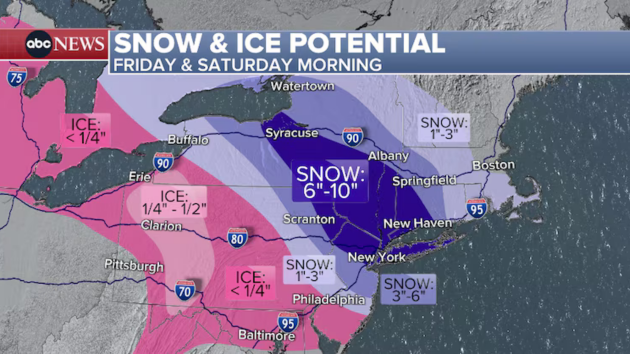Controversial state-run court system in Mississippi faces ongoing court battles
Written by ABC Audio ALL RIGHTS RESERVED on January 3, 2024

(NEW YORK) — A federal judge decided on Dec. 31 that Mississippi can move forward in creating a state-run court system of unelected judges and prosecutors to preside over part of the majority-Black city of Jackson. However, the U.S. 5th Circuit Court of Appeals separately temporarily blocked the court’s creation until Jan. 5.
This law, by the majority-white and Republican-controlled Mississippi Legislature, has been the source of controversy and contention in the state. Some residents and civil rights organizations claim it takes away Black residents’ right to vote for local officials.
What does this new system mean for Jackson?
Under this law, the state attorney general and the state Supreme Court chief justice will appoint attorneys and judges to serve the two courts, respectively, who would typically be voted for or appointed by local officials, as is the case with other Hinds County judicial officials.
These courts will serve the Capitol Complex Improvement District, which was created by the Mississippi Legislature to establish funding for infrastructure projects in downtown Jackson.
The legislation would also widen the Capitol Police’s jurisdiction.
The Republican-backed law was sponsored by state Rep. Trey Lamar, who argued that the effort would address crime in Jackson, as well as help with “a backlog, a need for assistance in the Hinds County judiciary.”
The controversy behind the law
Critics of the court system say it strips residents of their “constitutional rights” to vote for and elect their judges and prosecutors.
Jackson Mayor Chokwe Antar Lumumba called the law “the most oppressive legislation that we have seen in our city’s history” when it was passed in the state House in February 2023.
“It’s oppressive because it strips the right of Black folks to vote and it’s oppressive because it puts a military force over people that has no accountability to them,” he told reporters at the time. “It’s oppressive because there will be judges who will determine sentences over people’s lives. It’s oppressive because it redirects their tax dollars to something they don’t endorse or believe in.”
It was signed into law by Gov. Tate Reeves in April 2023.
“This legislation won’t solve the entire problem, but if we can stop one shooting, if we can respond to one more 911 call – then we’re one step closer to a better Jackson,” Reeves said in a social media post.
The civil rights group NAACP, alongside several Jackson residents, sued shortly after to stop the law’s Jan. 1, 2024, enforcement.
The complaint argued that the law is designed to “suppress and chill Black residents’ exercise of their First Amendment rights and strip Black residents of the political control they have fought to obtain and to which they are entitled.”
Black residents make up 82.8% of the city’s population, according to the U.S. Census.
“In violation of the Fourteenth Amendment, these laws target Jackson’s majority-Black residents on the basis of race for a separate and unequal policing structure and criminal justice system to which no other residents of the State are subjected,” read the complaint.
It continued, “Under this new regime and unlike in any other jurisdiction in Mississippi, in certain areas of Jackson, a citizen can be arrested by a police department led by a State-appointed official, be charged by a State-appointed prosecutor, be tried before a State-appointed judge, and be sentenced to imprisonment in a State penitentiary regardless of the severity of the act.”
Lamar waived off concerns, citing the court’s lower or “inferior” status, which means that decisions will be subject to scrutiny from a higher court.
“The people who voted for this bill are trying to make Jackson safer, that’s all they’re interested in and if you’re not committing crimes in Jackson, you really don’t have anything to worry about,” said Lamar.
The judge who decided to allow for the court’s creation, U.S. District Judge Henry Wingate, said plaintiffs failed to show they would be personally subjected to discriminatory treatment and therefore “lack standing to obtain the injunctive relief that they demand.”
However, the U.S. Court of Appeals for the 5th Circuit granted an administrative stay on the law’s enforcement pending appeal. The order noted that “nothing in this order is to be construed as indicating any view on the merits of any issue.”
Copyright © 2024, ABC Audio. All rights reserved.

 KVSP
KVSP 




